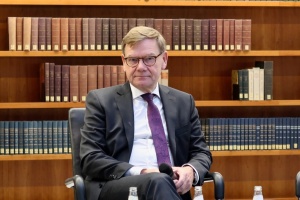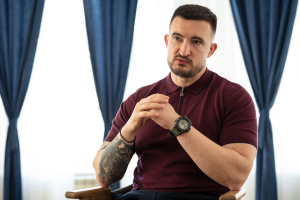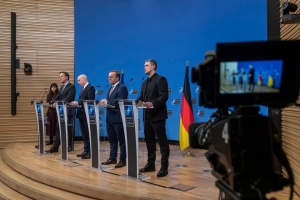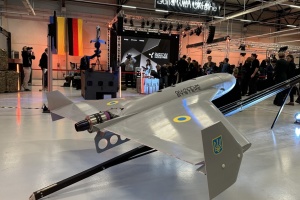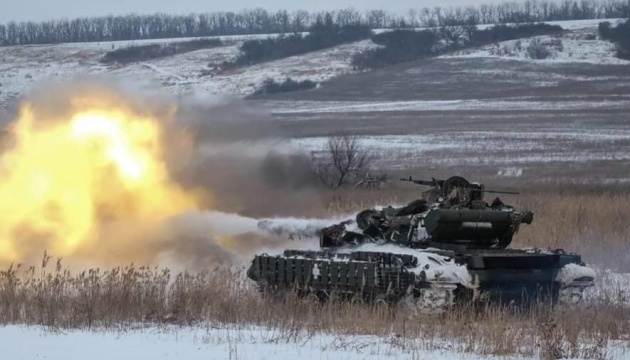
Ukraine Latest. Weekly Digest for December 16-22, 2024
Ukraine is set to receive first tranche of funds derived from the interest on immobilized Russian sovereign assets. Ukraine attacked the Novoshakhtinsk Oil Products Processing Plant, the largest in southern Russia, with indigenously made drones and missiles. Ukraine has a laser weapon, called "Tryzub", that can shoot down aircraft a mile away.
MAIN EVENTS OF THE WEEK
December 18: Ukraine has developed a laser weapon capable of shooting down targets from more than a mile away, the country’s drone force commander has claimed. Speaking at a gathering in Kyiv Wednesday, Vadym Sukharevskyi, Commander of the Armed Forces of Ukraine’s Unmanned Systems Force said, “We are the fifth country globally to possess this type of weapons. Named Tryzub, the weapon can shoot down aircraft with this laser at an altitude of over 2 kilometers (1.2 miles).” “It truly works, it truly exists,” he said, adding that efforts were being made to enhance the weapon’s scale and capabilities. The laser is named the Tryzub (Ukrainian for “trident”), a nod to Ukraine’s national symbol representing independence, strength, and unity. Sukharevsky did not offer any technical details about the Tryzub laser.
December 16: THE EU’s Council of Ministers has formally adopted the bloc’s largest sanctions package yet, adding a further 52 dark fleet vessels from third countries to its targeted list of blacklisted ships. All ships on the list, which were found to be engaged in high-risk shipping practices when transporting Russian oil or petroleum products, in arms deliveries, grain theft, or supporting the Russian energy sector, are now subject to a port access ban and a ban on provision of services. The measure is intended to target non-EU tankers that are part of Putin’s shadow fleet circumventing the oil price cap mechanism or supporting the energy sector of Russia, or vessels that are responsible for transporting military equipment for Russia or involved in the transport of stolen Ukrainian grain. The new listings include 54 persons and 30 entities “responsible for actions undermining or threatening the territorial integrity, sovereignty and independence of Ukraine”. As of Dec. 16, the EU has imposed 15 packages of sanctions targeting the Russian state and economy in response to Moscow’s full-scale invasion of Ukraine. The latest package further targets a chemical plant, a Russian airline company providing support to the military, and several arms manufacturing companies. For the first time, the EU imposed full-scale sanctions — including a travel ban and asset freeze “on various Chinese actors supplying drone components and microelectronic components” to Russia. Individual listings include the Russian military unit responsible for a deadly strike against the Ohkmatdyt children’s hospital in Kyiv in July, top managers of energy companies, individuals involved in the deportation of Ukrainian children, dissemination of propaganda, and sanctions circumvention, and two senior North Korean officials.
COMMENT: Volodymyr Zelensky, President of Ukraine: “There are sanctions against the shadow fleet of tankers employed by Russia to sustain its war aggression. And this is a crucial move now: to make sure all Russian tankers, all companies and individuals that help Russia support the war are eventually sanctioned. We must continue this pressure on Russia and not let it adapt to the sanctions.”
Ukraine will receive €1.5 billion monthly in financial assistance from the European Union through 2025. Payments will be in tranches beginning in January, António Costa, President of the European Council has announced. According to Costa, the EU will provide Ukraine with an additional 4.2 billion euros in December to “support the Ukrainian budget.” “In addition to this, starting next month, we will provide €1.5 billion in monthly aid for another year,” the European Council president said.
December 19: President Zelensky attended a meeting with heads of state and government of France, Germany, Italy, Denmark, the Netherlands, Poland, the Czech Republic, the Secretary General of NATO, the President of the European Council and the President of the European in Brussels on Wednesday to discuss support for Ukraine in its war with Russia. The meeting comes as European countries face the possibility of the U.S., Ukraine's largest source of support, changing its approach to the conflict when Donald Trump returns to the White House in January.
December 19: President Volodymyr Zelensky met with the new president of the European Council, Antonio Costa, and European Commission President Ursula von der Leyen during a two-day summit in Brussels on Thursday. Zelensky and Costa discussed how support for Ukraine and Western efforts to achieve a "just peace." “As we approach the start of the new year, we really need unity between the United States, the EU, and European countries," Zelensky said alongside Costa. "Only together, the U.S. and Europe can truly stop [Russian President Vladimir] Putin and save Ukraine,” he said. Among other topics, the two discussed protecting Ukraine's energy infrastructure from Russian aerial attacks and a boost to Ukraine’s domestic defense production. In a separate meeting, Zelensky and Ukrsula von der Leyen also discussed Kyiv's accession to the EU and the use of Russia’s immobilized assets for Ukraine's needs. Earlier this month, the U.S. Treasury Department announced that it will provide $20 billion in loan assistance to Ukraine, marking its contribution to a broader $50 billion initiative supported by G7 countries. Ukraine is expected to receive 18.1 billion euros ($18.8 billion) in macro-financial aid from the EU as part of the G7 loan. The first tranche will be disbursed in January 2025, Zelensky added.
December 18: Below are key takeaways from President Zelensky’s direct line with Le Parisien readers:
* no country or world leader are empowered to negotiate with Russia on behalf of Ukraine. Any dialogue with the Kremlin is only possible with an agreed plan of action on the table and solely from a position of strength;
* the US president-elect Donald Trump knows of Ukraine's reluctance to surrender and freeze the war;
* Ukraine does not receive enough aid to win the war. At the same time, partners could strengthen Ukraine's capabilities to manufacture and possess modern weapons, thus investing in the defense of Europe;
* the world should have sanctioned Putin at least for his threat of the use of nuclear weapons;
* Kyiv has received signals from individual world leaders suggesting it should lower the age threshold for eligibility for war conscription. However, Ukraine is focused on preserving the lives of its youth and improving technological capabilities of its armed forces;
* Ukraine does not yet have the strength to recover Crimea and part of Donbas, which Russia “physically” controls, but the West can influence Putin to force him to the negotiating table;
* Ukraine has repeatedly approached U.S. authorities, requesting a license for local production of Patriot missile defense systems. While no one has explicitly denied the license request, no progress has been made.
December 18: European Commission disbursed nearly €4.1 billion to Ukraine under the first pillar of its Ukraine Facility. This brings to €16.1 billion the total EU funding disbursed to the Ukrainian government under the Facility so far. Following the payment request submitted by Ukraine, the Council endorsed the Commission’s assessment that Ukraine has satisfactorily fulfilled the nine reform indicators linked to the second regular quarterly payment. These reforms, covering business environment, labour market, regional policy, energy market, environmental protection and the fight against corruption have been set out in the Ukraine Plan. For the period 2024-2027, up to €50 billion in grants and loans will be provided under the EU’s Ukraine Facility to support the country’s efforts to sustain macro-financial stability, promote short-term recovery and rebuild and modernise whilst implementing key structural reforms to advance on its EU accession path.
December 19: The European Commission (EC) announced on Thursday its decision to disburse a €18.1 billion macro-financial assistance loan to Ukraine starting in early 2025. The EUR 18.1 billion loan will be disbursed in tranches over the course of 2025. The first tranche is due in early January. The loan will be repaid from the proceeds from frozen Russian assets. "This decision was taken after the commission concluded that Ukraine has fulfilled all the political conditions agreed upon for the disbursement of this money," the EC said in a communiqué.
December 18: The World Bank said on Wednesday its executive board approved $2.05 billion in Development Policy Operation funding for Ukraine that includes the first grant from a new $20 billion U.S. loan fund for Kyiv that is secured by income from frozen Russian sovereign assets.
December 19: Suspected Russian hackers have launched one of the largest cyberattacks on Ukraine’s state services in recent months. The attack targeted Ukrainian state registers, which store various types of official records, including citizens' biometric data, business records, property ownership, real estate transactions, legal and court decisions, voter information, tax records and permits. Access to the registers was temporarily suspended for security reasons following the attack, said the Ministry of Justice, which manages around 60 state databases. The operation disrupted the operation of Ukraine’s military app, Reserve+, which serves as an electronic military registration document, as well as e-government app, Diia, used by over 21 million citizens, temporarily shut down dozens of services, including business and property registration, child benefits payments, marriage applications, and disability assistance for children. The country’s cyber agencies are currently investigating the attack. Ukrainian Deputy Prime Minister for European and Euro-Atlantic Integration, Olha Stefanishyna, stated during a press briefing Fiday that it would take about two weeks to restore access to the most critical registers, including those storing citizens' personal data and information about legal entities and property rights. Ukraine’s state security service (SBU) suspects that Russian hackers linked to the country’s military intelligence service (GRU) are behind the attack. Among the threat actors with suspected ties to the GRU is Sandworm, a group responsible for major cyberattacks targeting Ukraine, including the 2023 hack of Ukraine’s largest telecom operator, Kyivstar. All the data from the registers is safe and will be restored, as the operator has backups, Stefanishyna said.
December 21: Defense Minister Rustem Umerov, in a telephone conversation with the Pentagon chief Lloyd Austin, discussed further military support for Ukraine and the agenda for the next meeting of the Ukraine Defense Contact Group (otherwise known as Ramstein group), which is set to take place in early January 2025.
December 21: Oleksandr Usyk retained his WBA, WBC and WBO world titles when he defeated Britain’s Tyson Fury on points in a defining contest in the early hours of Sunday morning in Riyadh, Saudi Arabia. Usyk boxed with clinical authority to win clearly by a score of 116-112 on all three cards. The pair first fought in May of this year with Usyk taking the win via split decision. Usyk, now undefeated in 23 professional fights, raised the so-called “Hetman Ivan Mazepa’s Saber” over his head after his triumphant victory against Fury.
December 21: Claims that air defense personnel are being reassigned to infantry roles due to troop shortages are "not credible, and incorrect," the General Staff of Ukraine's Armed Forces said in a Facebook post on Saturday. The response follows the publication of a December 21 report by the Guardian, that claimed highly trained air defense specialists were being reassigned to infantry roles, weakening Ukraine's air defense capabilities. The Facebook post said that while some soldiers from rear units have been reassigned to combat positions, this does not include air defense specialists" tasked with protecting Ukraine’s skies." “Reassignments involve military personnel from the Security Forces of Ukraine, some rear mobile fire groups, as well as personnel not involved in the maintenance and operation of high-tech armaments, and military equipment,” the statement said. The General Staff also said air defense operations remain effective. “The number of shot-down drones has not decreased,” the statement said. The Guardian's report attributed this alleged shift to several factors, including a growing shortage of troops, Ukraine's refusal to lower the age of conscription despite U.S. insistence, and the deployment of older, less well-trained individuals to the front lines. The news comes amid escalating aerial threats against Ukraine, marked by a Russian attack on Dec. 20. Five ballistic missiles targeted Kyiv, while other oblasts across the country faced widespread attacks. Just a day earlier, Russian President Vladimir Putin proposed to “test” Western air defenses by launching an Oreshnik intermediate-range ballistic missile at the Ukrainian capital.
THE WAR AS IT IS
December 16/ Hetman: What will happen to the hryvnia, wages, salaries, and production? Economic forecast for 2025
December 16/ Victory Commanders series interview: Roman Hryvnak on DPRK soldiers’ engagement in war, AWOLs and defectors, recruiting for war, transformation into a commander and our victory
December 17/ Nation of the Invincible series interview: Kostyantyn Humenyuk on unique frontline operations, experience on blood and emotional doctor burnout
December 17/ Shorts. Humenyuk: our military surgeons are pioneering modern surgery practices
December 20/ Video: Russia’s ballistic missile attack on Kyiv left dead and wounded casualties, vehicles smashed, buildings severely damaged
December 17/ Human rights ombudsman visited a subway school in Kharkiv
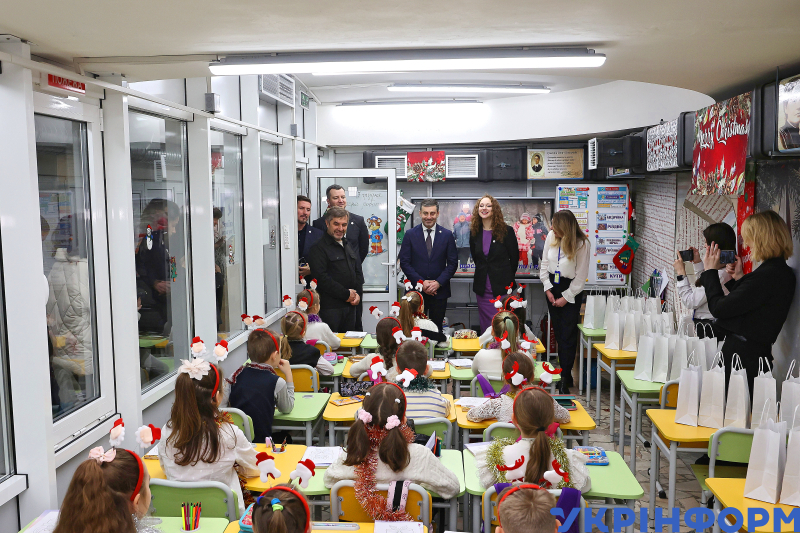
December 18/ Rehabilitation center for severely wounded soldiers was ribbon-cut in Kyiv
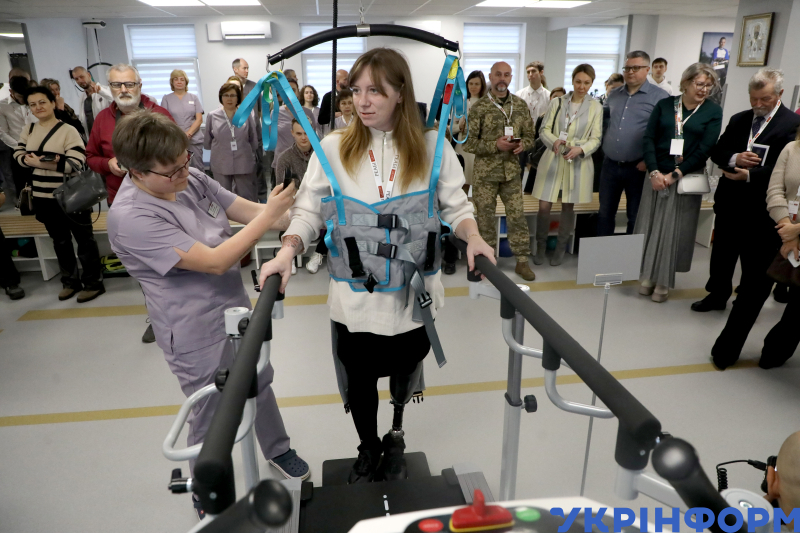
December 19/ Fallen defenders’ children presented with Christmas trees, gifts in Kyiv
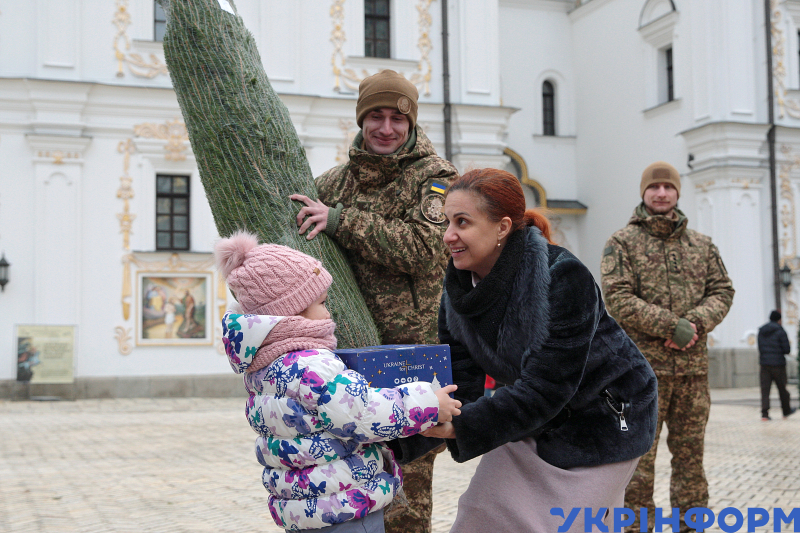
December 19/ Final farewell and funeral ceremony for actor and soldier Yakiv Tkachenko took place in Dnipro city
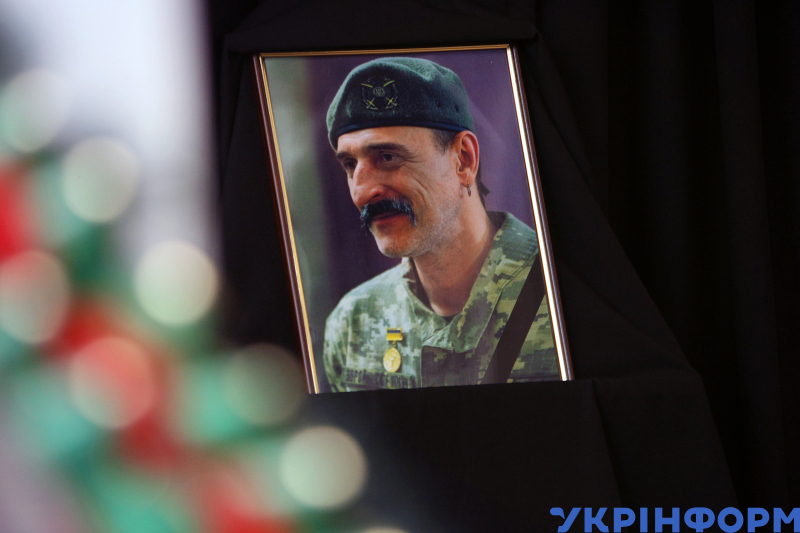
December 20/ The aftermath of Russian missile attack on Kyiv’s Holosiivsky District
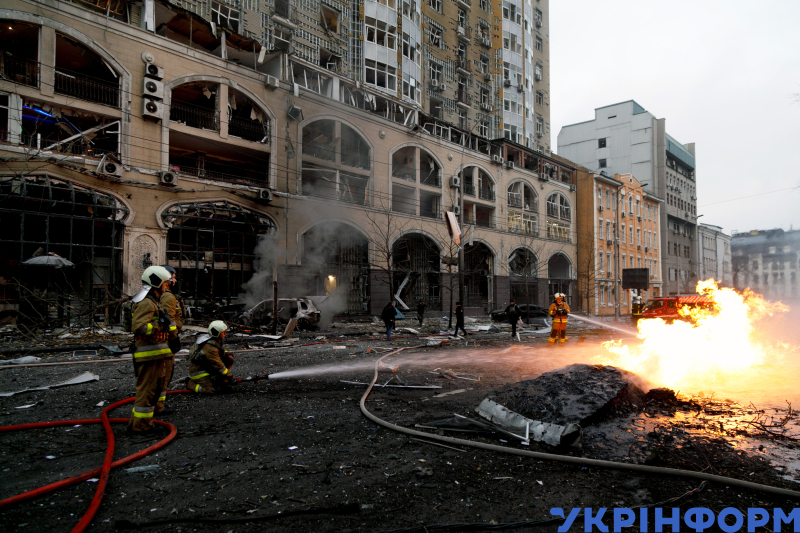
December 20/ St. Nicholas Cathedral in Kyiv sustained damage in the aftermath of a Russian missile attack
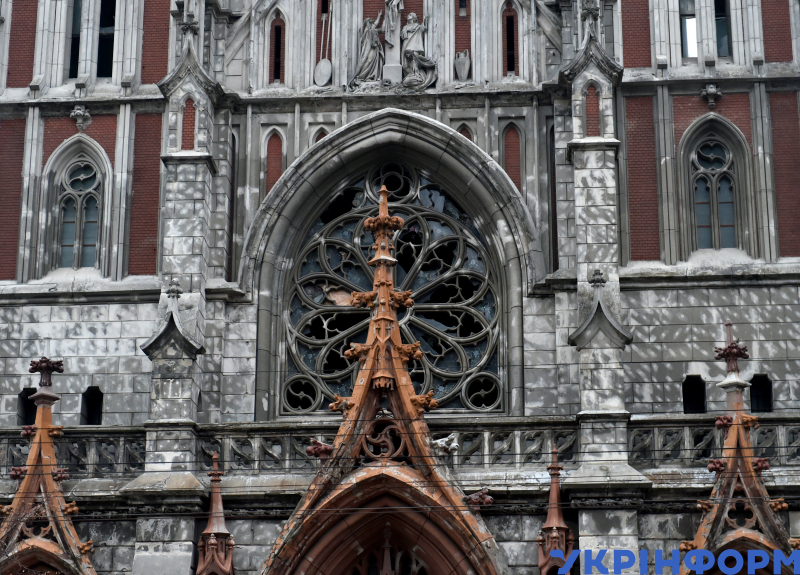
UKRAINIAN BATTLEFIELDS
Attacks on the Russian Federation and Russian occupied Ukraine:
December 21: Ukraine staged an attack with at least seven drones targeting the Russian city of Kazan, 1,000km (620 miles) from the frontline, on Saturday morning, damaging residential buildings and temporarily shutting down the airport. A drone smashed into a high-rise luxury apartment block and damaged a skyscraper in the city of more than 1.3 million but there were no casualties, local officials said. Videos posted on Russian social media networks showed drones hitting a high-rise building and setting off fireballs. Foreign ministry spokeswoman Maria Zakharova said two drones hit a 37-storey apartment block and that Ukraine had been targeting an unspecified industrial facility but that it suffered no damage. Residents of the capital of Tatarstan reported the sounds of explosions coming from a local gunpowder plant. Head of Ukraine’s Center for Misinformation Countermeasures Andrii Kovalenko said that the drones could have attacked the Kazan Gunpowder Plant - one of the key elements to Russia’s defense-industrial complex. Ukrainian president Volodymyr Zelensky said on Saturday without specifically mentioning the strike on Kazan: “We will definitely continue to strike at Russian military targets with drones and missiles.” Some Kazan residents were evacuated – Russian authorities did not provide figures – and all major public events in the area were cancelled as a precaution after the strikes. Russian civil aviation authority Rosaviatsia temporarily closed Kazan international airport, one of the country’s busiest, but reopened it later on Saturday. Alongside the drones that hit the apartment block, three drones were shot down and as many suppressed by air defence systems, the foreign ministry said. The attack on Kazan – about 800km east of Moscow – came a day after Russian strikes on the Ukrainian capital Kyiv killed one person and wounded 13 others, and after five were killed by a Ukrainian attack on the Russian border region of Kursk.
December 19: The Ukrainian Armed Forces’ General Staff confirmed a successful attack on an oil refinery in Novoshakhtinsk, the Rostov region of Russia. The attack left at least one fuel storage tank at the facility burned down, and operations of both of its ELOU-AVT-2.5 catalytic cracking units ceased. Ukraine has previously targeted the Novoshakhtinsk oil refinery with drone strikes. The General Staff claimed that a July attack on the refinery destroyed 1.5 million tons of oil and oil products worth $540 million.
COMMENT: Andrii Kovalenko, head of the Center for Misinformation Countermeasures under the National Security and Defense Council: “Diesel fuel and aviation kerosene are critical resources for military equipment, tanks, armored vehicles and aircraft. The plant provides supplies of these fuels to Russian military. The plant’s proximity the border with Ukraine makes it critical as logistics hub for the Russian military, making it a legitimate military target.”
December 17: Ukraine’s state security service, the SBU, has claimed responsibility for the assassination in Moscow of a high-ranking general in the Russian armed forces. Lt Gen Igor Kirillov, head of the Radiation, Biological and Chemical Defense Forces, was outside a residential block early on Tuesday when a device hidden in a scooter was detonated remotely. A day earlier, on Monday, the SBU charged Kirillov, 54, in absentia, saying on Telegram that he was "responsible for the mass use of banned chemical weapons".
December 16: A Russian ammunition depot near the occupied village of Markine in Donetsk oblast came under attack with drones launched by the SBU. The facility stored "thousands of ammunition rounds for armored personnel carriers, tanks, anti-tank guided missiles, mines, grenades, and millions of rounds of ammunition of various calibers," an SBU source said. A nearby fuel and lubricants depot was also destroyed as explosions could be heard in the area throughout the night.
December 18: Ukrainian forces reportedly struck a Russian chemical plant in Rostov Oblast’s Kamensk-Shakhtinsky on Monday. Using at least 13 missiles and 84 drones, Kyiv struck the region and caused a fire to break out at the Kamensky chemical plant known for making rocket fuel, among other components. That same day, the Taganrog Metallurgical Plant was reportedly attacked. A video of the attack was posted on local social media, where eyewitnesses suggest that the Taganrog Metallurgical Plant was hit. The footage shows explosions and plumes of intense smoke rising into the sky after the attack.
December 20: Explosions were heard in occupied Donetsk, where local residents reported a missile strike on the building of the so-called Ministry of State Security of the Donetsk People’s Republic (DPR). The building was used by Russia’s FSB Federal Security Service for interrogating and torturing captured Ukrainian soldiers before sending them to the notorious Izoliatsia prison.
December 20: An An-72 military transport aircraft worth USD 4.5 million was destroyed by an explosion at Russia’s Astafyevo airfield outside Moscow on Friday.
December 22: A massive Ukrainian drone attack targeted an oil depot near the city of Oryol in western Russia overnight, causing an intense fire at the site. Videos posted on social media and shot by local residents show heavy explosions lighting up the night sky around the city. The extent of the damage caused was not immediately clear. The attack came just one week after Ukrainian drones hit the same oil depot, causing a large fire to break out. The fire reportedly was burning for several days following the attack. The General Staff of Ukraine’s Armed Forces said after the Dec. 14 attack that the depot in the Stalnoy Kon (Steel Horse) village is among the most capacious oil product depots in Russia and is “part to the Russian military-industrial complex, providing supplies of petroleum products for Russian troops in the Kursk, Bryansk and Belgorod regions, as well as Ukraine’s Kharkiv region.
HOSTILITIES
December 16: A sniper from Ukraine's Defense Intelligence (HUR) active operations unit, known by call sign ‘Lector,’ eliminated a Russian soldier with a .338 Lapua Magnum round at a distance of 2,069 meters, thus setting a new record, HUR reported. The confirmed previous record for this caliber belongs to British sniper Corporal Craig Harrison of the Blues and Royals regiment. In November 2009, during the war in Afghanistan, he successfully eliminated two Taliban fighters at a distance of 2,475 meters and damaged their machine gun. “Harrison fired from a prone position, located significantly higher than his targets. According to the corporal, his accuracy was aided by calm weather and clear visibility. However, before hitting his mark, the British sniper had to take nine calibration shots,” HUR explained. Lector operated on nearly the same elevation as the Russian soldier. Firing under the harsh conditions of a Ukrainian December, he took aim from a trench at a moving target concealed in a tree line—and hit his mark with a single shot. Chief of the Defense Ministry’s HUR intelligence branch, Lieutenant General Kyrylo Budanov, commended Lector for his record-breaking shot thus: “A masterful accomplishment that will undoubtedly go down in the history of our fight for freedom. Hitting a moving target at such a distance is a tremendous achievement and a testament to the exceptional professionalism and focus for which Ukrainian defense intelligence snipers are renowned. We will continue our fight to eliminate even more Russian occupiers!” In civilian life, Lector worked as a gamekeeper. He joined Ukraine's Security and Defense Forces alongside his son. Initially, he served in the intelligence unit of a Territorial Defense Brigade, and since February 2023, he has been fighting as part of the HUR’s active operations unit. Lector says he selects a specific type of rifle for each mission. The historic 2,069-meter shot was made with a Sako M10.
December 20: The Defense Forces of Ukraine took out 2,200 Russian soldiers – a record high since the war began in February 2022.
December 18: Defense Minister Rustem Umerov visited the headquarters of the operational-strategic force grouping "Khortytsia" and the AFU’s Unmanned Systems Force. During a meeting with the "Khortytsia" OSUV commander Major General Andrii Hnatov, the minister discussed frontline situation and the urgent needs of the deployed troops.
December 16: DPRK forces involved in support for Russia’s war effort against Ukraine are being reinforced with fresh personnel to sustain active combat operations after having suffered losses during assaults alongside Russian forces operating in Kursk Oblast. This is according to Ukraine's HUR defense intelligence service. DPRK army units lost at least 30 soldiers killed or wounded on December 14 and 15 during fighting in the areas of Plyokhovo, Vorozhba, and Martynovka in the Kursk region of Russia. Additionally, HUR claims that at least three North Korean servicemen purpotedly went missing near the village of Kurilovka. "To compensate for these losses, assault groups are being replenished with fresh personnel, particularly from the DPRK army's 94th Separate Brigade, to continue active combat operations in Kursk," HUR said in a press report.
December 14: The Defense Forces destroyed 181 Russian vehicles, mostly trucks and light motor vehicles over the day – a record high since the war’s onset, according to the Ministry of Defense.
December 16: Soldiers from the 77th Independent Naddnipryanska Airmobile Brigade, supported by the Achilles drone battalion, repelled a massive Russian armored attack on Borivske axis.
December 16: In Kursk oblast of Russia, AFU’ Special Operations Forces wiped out a platoon of Russian soldiers who attempted to assault Ukrainian fortifications on three armored security vehicles, and took several others into captivity.
December 16: The Ukrainian Defense Forces regained their lost positions in the surroundings of Kolesnykivka village near Kupyansk, Kharkiv oblast.
December 16: The Defense Forces are conducting an operation near Uspenivka in the Donetsk region, which is aimed to achieve "maximum exhaustion of the enemy, destruction of his resource, and preservation of our personnel."
December 16: The Defense Forces of Ukraine successfully fended off Russian attacks targeting an area surrounding the settlement of Pishchane outside Pokrovsk in the Donetsk region. Currently, there are no Russian saboteurs in Pokrovsk, and fighting on the outskirts of the town has ceased.
December 17: The border guard brigade Pomsta (Ukrainian for ‘revenge’) operating on Siversk axis fought off a massive enemy attack intended to break through towards Siversk town. The fighting left 14 invaders dead and 12 others severely wounded.
December 17: Soldiers from the 8th Prince Izyaslav Mstyslavych Special Operations Regiment staged a “warm welcome” for the North Korean troops fighting Ukrainian forces in Russia’s Kursk border region. The Ukrainians took out 50 enemy soldiers and wounded 47 others between Saturday and Monday. The Russians are throwing North Korean soldiers into battles near [currently Ukrainian controlled] Sudzha without providing them with mobility support, according to an assessment by the Center for Misinformation Countermeasures.
December 18: AFU Commander-in-Chief Oleksandr Syrsky said that the number of Russian occupying troops in Ukraine is steadily growing, with “an additional 100,000 Russian soldiers having been deployed during 2024”.
December 18: Defense Forces are fighting Russian invaders on the southeastern outskirts of Kurakhove and in Chasiv Yar, several Ukrainian fortifications and positions have been destroyed.
December 18: DeepState crowd-sourced monitoring website reported that the village of Sontsivka in Donetsk oblast has fallen to Russian control.
December 19: The North Korean 11th Army Corps lost around 200 troops killed and wounded in a series of assaults on Ukrainian positions in western Russia’s Kursk Oblast last weekend, according to the latest official assessment from Andrii Kovalenko, head of the Center for Misinformation Countermeasures in Kyiv.
December 19: Units of the Defense Forces frustrated a Russian armored offensive on Kupyansk axis, having destroyed 21 tanks and armored combat vehicles.
December 19: On Orikhiv axis, Zaporizhzhya oblast, the situation has exacerbated as Russian invading forces are shelling Ukrainian fortifications with artillery fire with ever increasing intensity. The adversary is seeking to capture a dominant height near Nesteryanka but is failing to achieve this.
December 20: Groups of Russian saboteurs attempted to infiltrate into Kherson city, but were exposed and defeated.
December 20: The AFU Headquarters dismissed news reports about the alleged encirclement of the Ukrainian forces defending Uspenivka and Trudove.
December 21: Poland has handed over two Mi-8 helicopters and one Bell 412-HP to Kharkiv National University of Internal Affairs. The aircraft have been transferred for use in training, according to Vasyl Bodnar, Ambassador of Ukraine to Poland.
December 21: Fierce fighting continued in urban areas of Kurakhove, Chasiv Yar and Toretsk, currently the hottest stretches of the frontline, with the signs suggesting that Russia is amassing more troops to sustain its offensive effort.
December 21: The Russians were attempting to win tactical gains by assaulting with armor through Kucherivka and Synkivka communities and towards Terny and Zeleny Hay. Ukrainian defenders repelled the attacks and destroyed advancing Russian columns. On a parallel track, Russian troops were assaulting Ukrainian positions near Velyka Novoselka, but suffered a defeat and retreated.
December 22: On Kupyansk axis, Ukrainian solders fended off a massive armor assault, having destroyed plenty of hostile vehicles and personnel. The enemy personnel, having lost their equipment, found themselves unable to maneuvers and attack further, and those hiding for safety in a nearby tree belt had been wiped out in drone strikes.
THE WEEK IN NUMBERS AND PICTURES
Russian drone and missile attacks on the Ukrainian regions of Donetsk, Kherson, Chernihiv, Zaporizhizha, Dnipropetrovsk, and Kharkiv left 8 people dead and 73 others injured over the week reviewed.
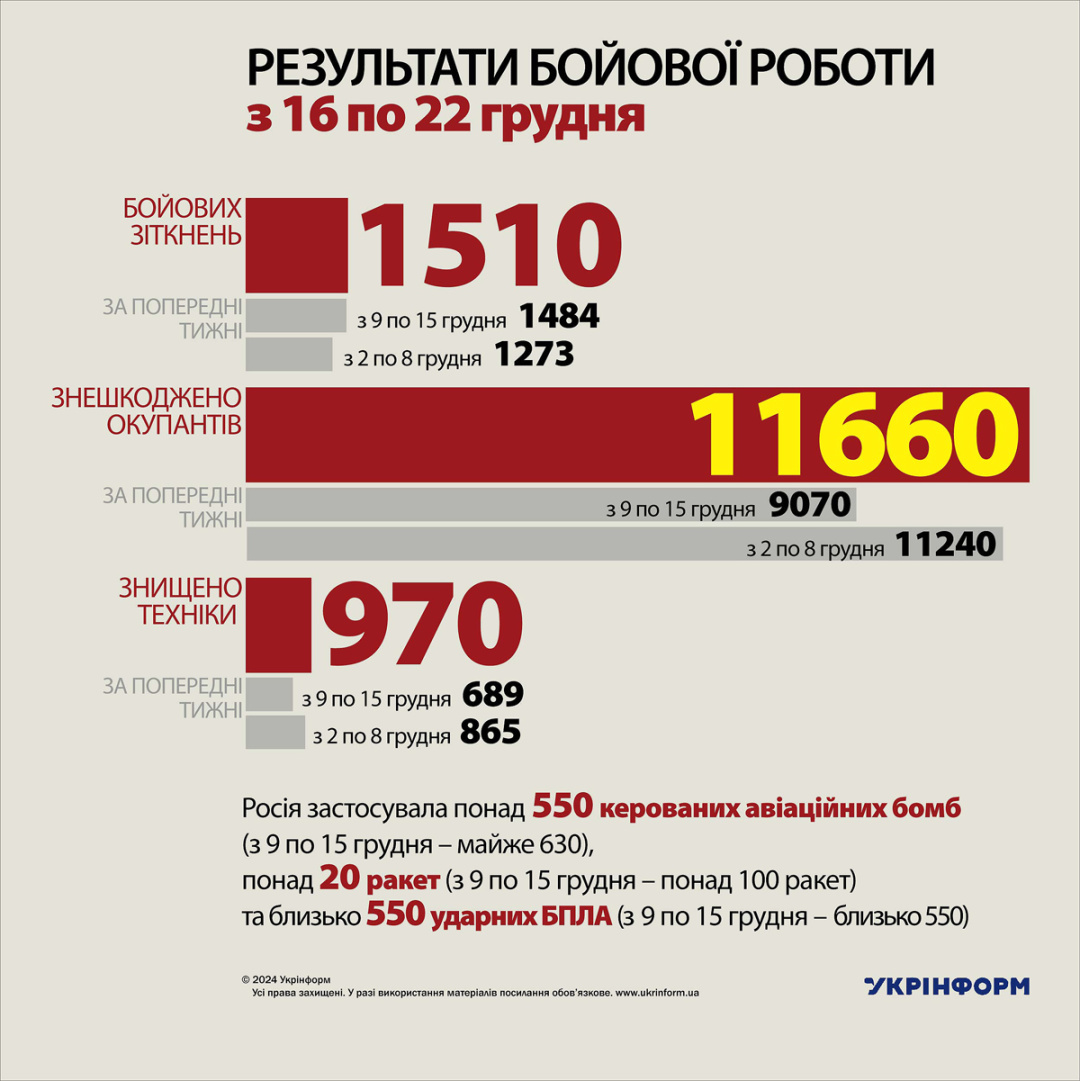
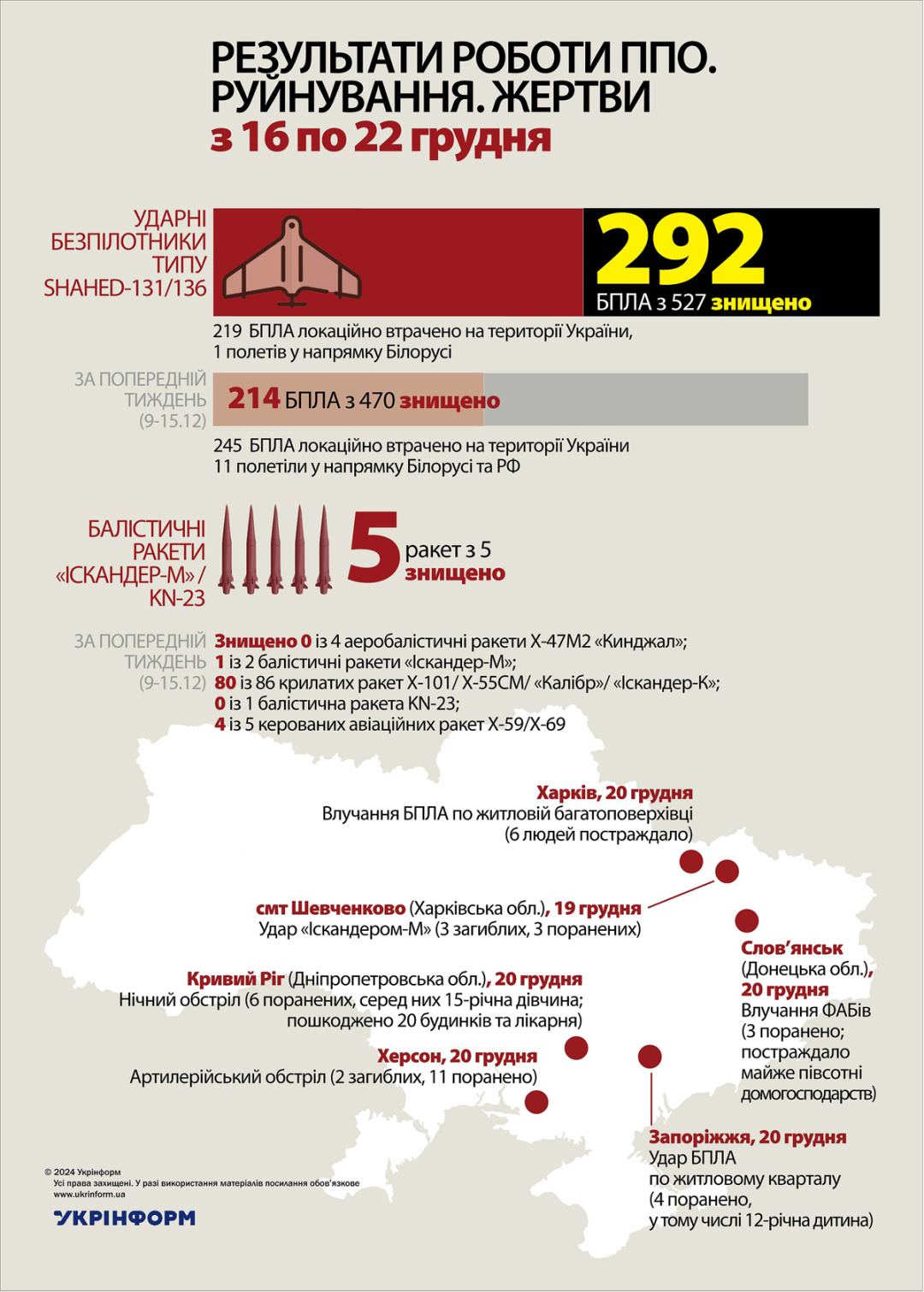
WAR AFTERMATH
Human losses & War crimes:
Russian occupying forces have deployed over 4,800 attacks against Ukrainian defenders with banned chemical munitions since the outset of the all-out invasion in February 2022. The attacks were ordered personally by Lt. Gen. Igor Kirillov, now assassinated commander of Russia’s Radiological, Chemical and Bacteriological Defense Forces.
December 22: The 110th Lt. Gen. Mark Bezruchko Independent Mechanized Brigade shared a video revealing a new war crime committed by Russian military - the execution of five Ukrainian soldiers who surrendered on the battlefield. Ukraine’s Human Rights Ombudsman, Dmytro Lubinets has submitted relevant reports with United Nations and the International Committee of the Red Cross.
Since the outbreak of Russia’s all-out invasion of Ukraine in February 2022, there have been recorded and officially confirmed 177 cases of Russian personnel executing Ukrainian POWs who surrendered on the battlefield, including 109 cases recorded for 2024.
Ukraine has been able to repatriate 168 of its citizens from Russian captivity, while over 16,000 others still remain captive by the Russian Federation.
In 2024, Russia has staged 12 massive attacks with drones and missiles targeting energy grids in Ukraine, having fired some 1,100 cruise and ballistic missiles.
Since the beginning of the full-scale Russian invasion, 1,087 Ukrainians have suffered from Russian planted mines and other explosive hazards. The casualties include 16 children dead and 88 others injured.
Ukraine recovered the bodies of 503 fallen soldiers and civilians from Russia as part of the latest round of prisoners’ swap.
Since February 2022, the United Nations has officially recorded the deaths of more than 12,300 people in Ukraine in the aftermath of Russia’s war of aggression, this in addition to over 27,800 wounded casualties.
Author and volunteer Yevhenia Dukhopelnikova has died at war. Eternal memory to the Heroine...
Health care sector:
Since the outset of the full-scale war in Ukraine, 1,938 health care facilities have been severely damaged and 297 others reduced to ruins in Russian attacks as of mid-December 2024, with the worst affected regions being Kharkiv, Donetsk, Mykolaiv, Kyiv, Chernihiv, Dnipropetrovsk, Kherson and Zaporizhzhia.
Environment
December 19: Two Russian oil tankers damaged in stormy weather over the weekend have spilled about 3,700 tons (3,350 tonnes) of low-grade fuel into the Kerch Strait off the coast of Russian-occupied Crimea, Russian state media reported on Monday, threatening an environmental disaster in the biodiversity hotspot. The vessels were carrying about 9,200 tons (8,300 tonnes) of mazut – a heavy, low-quality oil product that’s mainly used in power plants. The tankers were on their way to deliver fuel for the Russian Navy amid Russia’s war on Ukraine when they got caught in the bad weather and broke apart on Sunday. At least one crew member on one of the ships died in the storm, Russian authorities said. Environmental experts have sounded the alarm on what they say could be a difficult spill to contain as videos emerge of oil-slicked birds and stretches of blackened shorelines. Ukraine, which claims the area as its territory, has accused Moscow of violating sea regulations by using old vessels, and is calling for more stringent international sanctions on Russia.
UKRAINIAN HOME FRONT
President Volodymyr Zelensky:
submitted to the Verkhovna Rada of Ukraine for ratification the Council of Europe’s Convention on Offenses relating to cultural property (2017 Nicosia Convention);
enacted a legislation expanding the listing of recipients/acquirers of humanitarian aid for the duration of martial law plus 12 months after its expiration;
met with energy sector workers and presented them with state awards;
during a video conference with Czech President Petr Pavel, discussed plan to open a representative office of the Ministry of Unity in the Czech Republic and briefed his Czech counterpart on Ukraine's urgent needs for air defense capabilities and armored combat vehicles;
dismissed Ukrainian ambassadors to a number of states;
appointed new ambassadors to a number of countries;
revoked his decree appointing Emine Dzhaparova as Permanent Representative of Ukraine to international organizations in Vienna;
appointed Mariana Beca to replace Iryna Borovets as chairperson of the National Commission for UNESCO affairs.
December 17: met visiting Polish Prime Minister Donald Tusk in Lviv. Tusk announced a new military aid package for Ukraine, the 46th of its kind, valued at €100 million, which is se to be delivered in January. Following his visit, Prime Minister Tusk made a significant appeal to his colleagues at the European Council, addressing concerns regarding speculation about Ukraine’s potential defeat at the front line. “My appeal to Western leaders from Lviv. Stop speculating about Ukraine’s possible defeat. It has nothing to do with the facts. Ukraine, despite some naysayers, defends itself effectively against Russian aggression, even though no one gave it a chance in the first days of the war. Do you remember? You remember it best. And you have proven in all those years that you must think with faith in your strength. And you believed in your strength. Now is the time for the whole West to believe in its own strength, capability, and its ability to convince all the actors of this great game that Ukraine and the whole world deserve just peace and respect for territorial integrity and borders. We can no longer hesitate,” Donald Tusk posted on X.
December 18: Minister of Foreign Affairs Andrii Sybiha welcomed in Kyiv his Australian counterpart Penny Wong on the first visit to Ukraine by an Australian Foreign Minister in a decade. The Ministers agreed to resume the full operation of the Australian Embassy in Ukraine. Sybiha offerred his deep gratitude to Australia for its military aid, in particular the recent provision of 49 Abrams tanks and 14 boats. He noted that the amount of Australian aid to Ukraine has surpassed $1 billion, including $880 million worth of defense supplies. The Minister further briefed his counterpart on the urgent needs of the Ukrainian army and requested additional military support, including Australian Bushmaster armoured vehicles among other weapons. Andrii Sybiha also suggested that Ukraine's needs should be taken into account when decommissioning military equipment in service with the Australian Defense Force. ‘Supporting Ukraine is in Australia's best interest, as it bolsters stability not only in Europe but also in the Indo-Pacific region. We must increase pressure on the aggressor state and increase the cost of war for the Kremlin,’ Andrii Sybiha stressed. He invited Australia to attend the Ukraine Recovery Conference which is set to take place in Italy next year, saying Ukraine would welcome Australia and Australian businesses participating in Ukraine recovery and reconstruction projects. Mr Sybiha additionally hailed Australia's decision to transfer 50 million euros to the European Bank for Reconstruction and Development, as well as a contribution of 6.39 million USD to Ukraine’s Energy Support Fund. The Minister expressed his sincere gratitude to every Australian who supports Ukraine in its fight for freedom and justice. Mrs Wong, for her part, announced Australia was providing $66 million to assist Ukraine with reconstruction and recovery, $10 million to help Ukrainians access heat and electricity, and $80,000 for a charity that supports vulnerable families. She said the new announcements were on top of the $1.3 billion in aid already provided to Ukraine.
December 20: Lithuania has committed to investing in the production of the Palianytsia rocket drone, a crucial component of Ukraine’s long-range drone capability, and providing €10 million this year to the Danish initiative for weapons production in Ukraine. The news was announced by Ukrainian Prime Minister Denys Shmyhal following intergovernmental consultations Friday with Lithuania’s cabinet ministerial delegation led by Prime Minister Gintautas Paluckas. Lithuania’s contribution to Ukraine’s defense sector includes supporting the production of the Palianytsia rocket drone, which is part of Ukraine’s broader initiative to enhance its long-range strike capabilities. The Palianytsia drone missile has already shown promise in Ukraine’s defense efforts, with its serial production officially beginning on December 10. In addition to defense cooperation, the two heads of government discussed Ukraine's ongoing reconstruction efforts. Lithuania has pledged to support Ukraine’s reconstruction by providing decommissioned equipment from the Ignalina Nuclear Power Plant and Vilnius Thermal Power Plant. Furthermore, Shmyhal emphasized discussions on bolstering trade and economic ties, as well as Ukraine’s EU and NATO aspirations. He also underscored the need for increased sanctions against Russia and the creation of a mechanism to ensure that Ukraine not only receives the interest on frozen Russian assets but also the assets proper: "The aggressor must pay — this is only fair”. The Palianytsia rocket drone, a key development in Ukraine’s defense strategy, has already been successfully deployed in combat, marking a significant milestone for Ukraine's military capabilities. In addition, the Ukrainian armed forces are continuing trials of the new "Ruta" missile, further advancing efforts to strengthen their long-range strike capability.
December 21: President Zelenskyy said on Saturday that he had met CIA director William Burns in Ukraine – a rare public disclosure of a meeting between the pair. The Ukrainian president said he had met Burns on multiple occasions throughout the war but their meetings had been undisclosed. “Bill Burns paid his last visit to Ukraine as CIA director,” Zelensky said on Telegram, posting a photo of him shaking hands with Burns in front of a state crest of Ukraine. “He and I have had many meetings during this war, and I am grateful for his help. Commonly, such meetings are not publicly reported, and all our meetings – in Ukraine, in other European countries, in America, and in other parts of the world – were held without official notification.” Burns is set to leave the CIA post as US president-elect Donald Trump brings in his own nominee for the post. Zelenskyy reported that Bill Burns visited Ukraine on his last visit as CIA Director: “We had many meetings with him during this war, and I am grateful for the help.”
***
The Ministry of Defense:
codified and approved the use of the new domestically produced UAV "SOVA 10" within the Defense Forces. The new strike drone can carry a combat payload of several kilograms and operate in severe weather conditions across a wide range of air temperatures. “Each new model is manufactured with account taken of the performance recommendations from military users,” Deputy Minister of Defense Dmytro Klymenko has said. The "SOVA 10" drone is designed to carry out various combat tasks, including reconnaissance, engagement of targets, and functioning as a kamikaze drone. It is capable of operating in both hot and cold weathers, temperatures ranging from -10 to +40°C. The drone can lift payloads of up to 3 kilograms. Outfitted with two cameras, it can perform missions in daylight and twilight. With a 6S3P battery capacity of 12400 mAh, it can remain airborne for up to 15 minutes.
introduced the CRAB-LS robotic ground transporter into official service. As of December 18, the domestically produced platform has passed codification and is ready for active deployment. Designed for logistical support, the CRAB-LS (short for “Life Saver”) can deliver critical supplies such as ammunition, food and medicines to frontline positions. It also plays a crucial role in evacuating wounded personnel from the battlefield. According to the Ministry of Defense, the platform has already seen action, rescuing dozens of injured soldiers and performing supply deliveries in high intensity combat areas. Beyond logistics, the CRAB-LS offers combat capabilities. A military-grade variant, known as CRAB-M, supports reconnaissance and assault missions. The CRAB-M can be fitted with a PKT machine gun and an RPG-7 grenade launcher, as well as systems for remote mine laying and demining. The platform has a combat radius of 1.5 kilometers and can operate for up to four hours with a maximum range of 25 kilometers. Powered by a silent, high torque electric motor, CRAB-LS can navigate difficult terrains such as sand, swamps, shallow trenches and uneven landscapes. Its adaptability extends to its use as a ground-based “suicide drone” in specific scenarios. Controlled remotely via FPV goggles or a dedicated control panel, the CRAB-LS ensures precision and safety in its operations. Deputy Prime Minister Mykhailo Fedorov recently announced plans to deploy tens of thousands of uncrewed ground vehicles (UGVs) to the frontlines in 2025.
Since the start of the campaign to declare the possession of previously undeclared firearms three weeks heretofor, Ukrainians have declared more than 1,000 firearms possessed and voluntarily handed over 59 of them to the police.
NJSC Naftogaz of Ukraine has confirmed its anti-corruption system to be compliant with the international standard ISO 37001:2016 "Anti-corruption management systems".
At a meeting of the Congress of Local and Regional Governments under the auspices of the President of Ukraine on Tuesday, December 17:
the US has earmarked $177 billion in support aid for Ukraine, but not all the money and aid packages have arrived yet – Zelensky;
there is no need for intermediaries in relations with Trump – Zelensky;
the Defense Forces are conducting active combat operations along the frontline as long as over 1,170 kilometers, with Pokrovsk and Kurakhove being the most challenged stretches of the line – AFU chief commander Oleksandr Syrsky;
under eRecovery, reimbursement payments for damaged property amounting to UAH 8.4 billion have been endorsed for citizens, and housing certificates worth UAH 19.5 billion have been issued – Prime Minister Denys Shmyhal;
installation and commissioning works on energy equipment provided by international partners are underway across the country; over half the facilities handed over to communities have already been put into operation – deputy Minister for Recovery and Restoration Oleksiy Kuleba;
peace negotiations will begin once the enemy runs out of resources for war – Presidential Office head Andrii Yermak.
December 16: Prime Minister Denys Shmyhal, during a conversation with the Prime Minister of Slovakia Robert Fico Monday, said that Ukraine will not continue to transit Russian gas via its territory after the current contract expires on January 1, 2025, but is ready to discuss the transit of gas other than Russian.
December 17: The leader of the parliamentary group "Platform for Life and Peace", Yuriy Boyko was summoned for questioning to the SBU. The state security service summoned the politician for questioning regarding his latest statements about "radicals" and "the ban on speaking one's native language," that is, Russian, in Ukraine. After his interrogation at the SBU, Yuriy Boyko posted a video with apologies to Ukrainians and referring to Russian dictator Vladimir Putin as a “war criminal”.
The Cabinet of Ministers:
disbursed over UAH 37 billion in funding for the construction of fortifications on the third line of defense;
distributed UAH 41.429 million in budgetary subventions for furnishing bomb shelters at schools in Kharkiv;
appointed Yulia Hnatiuk as interim director of the Ukrainian Institute of National Remembrance;
established coordinating headquarters for Veterans' Policy;
endorsed the text of the draft law on "Unified State Registry of War Veterans";
streamlined purchasing procedures for domestically manufactured unmanned systems and electronic jamming equipment for the duration of martial law.
The Ministry of Digital Transformation has announced the launch of the “Diia-card”, which will consolidate all currently active and future eSupport payments in one single card.
The Verkhovna Rada of Ukraine:
endorsed a legislation on a unified registry of military service members;
endorsed second reading of bill on compiling and maintaining a listing of terrorist organizations (groups);
endorsed as basic draft law No. 9558 on amendments to selected laws to streamline medical care practices involving organ transplantation;
adopted as a whole a draft law to disband medical and sanitary expert commissions (MSEK) starting next year;
expelled MP Yuriy Boyko from the Human Rights Committee;
requested President Zelensky to revoke the title Hero of Ukraine from MP Yuriy Boyko.
The Army+ application added a feature allowing service members to submit reports for reinstatement after desertion from service.
In the Unified State Registry of newly conscripted soldiers, draft-liable persons and reservists, only the employee's deferrals issued through the Diia portal will be automatically pulled up; under other conditions, persons should additionally contact recruitment and enlistment centers at their respective places of residence.
December 21: Ukrainian intelligencе, assisted by the Ministry of Foreign Affairs evacuated 34 people from Syria through Lebanon, among them 31 Ukrainian citizens and three Syrian citizens who are relatives of Ukrainian citizens. The evacuees are reported to have landed safely at the Chisinau airport, from where they will continue travel to their Ukrainian homes.
After a serious injury and lengthy rehabilitation treatment, Olha Zvonareva, Ukrinform's reporter in the Zaporizhzhia region, was presented with the Medal of the Order of Merit awarded by the Presidential Decree issued on June 28.
A cultural heritage protection unit has been created within in the Armed Forces of Ukraine. This is a new measure implementing provisions contained in Article 2, Section 7 of the 1954 Hague Convention for the Protection of Cultural Property during Armed Conflict.
December 16: Ukrinform’s press center hosted a prize awarding ceremony for winners of Ukrinform’s “Theater Infoboom – 2024” ranking for Kyiv.
COMMENT: Serhiy Cherevaty, Ukrinform CEO: “I have been outside Kyiv, in eastern Ukraine, for two years, but I have already managed to see several performances, and I have become convinced that Ukrainian theater is alive, pulsating, active, and generating new fascinating theatrical forms. And I am convinced that this is just the beginning, and after our victory (which I have not doubted from the first day to this day), Ukrainian theater, amid this great tragedy that we are experiencing, unfortunately, will show a lot more not only to the Ukrainian theater, but to the European and world theaters as well.”
WAR ECONOMY
The International Monetary Fund confirmed its outlook for Ukraine’s GDP growth at 4% this year and 2.5-3.5% next year, but also predicted a significant improvement in 2026 and 2027 – to 5.3% and 4.5%, respectively. This is according to the official IMF statement following the completion of the sixth review of the Extended Fund Facility for Ukraine. “Economic growth in 2024 has been upgraded given better than expected resilience to the energy shocks. However, a slowdown is expected in 2025 due to an increasingly tight labor market, the impact of Russian attacks on Ukrainian energy infrastructure, and continued uncertainty about the war,” the IMF explained. It noted that inflation in Ukraine has been rising recently, mainly due to food prices, while inflation expectations remain “well anchored”. The IMF assesses that the government has managed to sustain adequate reserves by continued sizeable external support. Overall, the outlook remains subject to “exceptionally high uncertainty”.
In 2024, Ukrzaliznytsia, Ukraine’s railway monopoly, has carried 148 million tons of shipments, thus accomplishing a record high since the full-scale war broke out in February 2022.
The amount total of cash expenditures from base part of the National Budget reached UAH 3 trillion during January - November 2024, which is 365.7 billion UAH, or 13.9 percent up year-on-year.
Ukraine’s merchandize exports amounted to USD 34.7 billion over January-October 2024, representing a 15.7 percent growth year-on-year, while merchandise imports grew 10 percent to reach USD 57.4 billion.
The international credit reference agency Fitch Ratings has affirmed National Joint Stock Company Naftogaz of Ukraine's (Naftogaz) Long-Term Issuer Default Rating (IDR) at 'CC'.
ALLIED AND PARTNERS’ AID
Mike Waltz, Donald Trump’s nominee for National Security Adviser, has said that the world would welcome "some form of cessation" of hostilities in Ukraine, referring to Hungarian Prime Minister Viktor Orbán’s proposal for a "Christmas truce”, but declined to provide details about the Trump administration's future policies on Ukraine. Commenting on Trump’s recent meeting with Orbán in the US and the Hungarian prime minister’s truce idea, Waltz said he hoped that "the entire world would want to see some type of cessation to the slaughter that is happening in eastern Ukraine". President Zelensky said that the ceasefire, peace and prisoner swap initiatives suggested by the Hungarian Prime Minister Viktor Orban are political PR, and Orban does not have a mandate to negotiate any of these matters.
COMMENT: Volodymyr Fesenko, policy analyst, board chair of Penta Center for Applied Political Studies: Orban's "peace initiatives" are his self-promotion and an attempt to artificially boost his political leverage, to imagine himself as a major and influential international actor, and at the same time to promote himself as a potential intermediary in future peace negotiations. This is unlikely to have been agreed with Trump. If this were Trump's initiative, he would have put it forward on his own behalf. Trump is not inclined to share the glory. He should be the main peacemaker, and not give up this role to Orban. "
December 21: Hours before a midnight government shutdown, the US House of Representatives approved a new plan late on Friday from Speaker Mike Johnson that would temporarily fund federal operations and disaster aid but drops President-elect Donald Trump’s demands for a debt limit increase into the new year.
The Verkhovna Rada’s Commissioner for Human Rights Dmytro Lubinets met his Russian counterpart Tatyana Moskalkova in Belarus to hand over parcels and letters to Ukrainian prisoners held in captivity in that country. The two additionally verified the listings of POWs and exchanged bodies of the dead, with Kyiv having received 503 bodies and Moscow received 42.
December 18: The United States hit North Korea and Russia on Monday with new sanctions targeting Pyongyang's financial and military support to Moscow as well as its ballistic missile program. The sanctions, which list North Korean banks, generals and other officials, as well as Russian oil shipping companies, are the latest U.S. measure aimed at disrupting North Korea's support to Russia's war in Ukraine. The responses came as 10 countries, including the U.S., South Korea, Australia, Britain, France and Japan, as well as the European Union, issued a joint statement on Tuesday condemning Pyongyang and Moscow's military ties "in the strongest possible terms." The statement said North Korea's support for Russia's war against Ukraine was a "dangerous expansion of the conflict" and a "flagrant violation" of United Nations' sanctions. It urged the country to withdraw its troops from Russia. Pyongyang and Moscow have ramped up diplomatic and economic ties in recent years, culminating in Russian President Vladimir Putin's visit to North Korea in June when the countries' leaders agreed a mutual defense pact.
December 16: Norway has committed approx. 2.7 billion Norwegian kroner ($242.38 million) to Ukraine to help it bolster its naval capability, Prime Minister Jonas Gahr Støre announced on Monday. Jonas Gahr Støre said the funds are crucial to protect Ukraine from Russian Black Sea Fleet attacks, safeguard the export of grain and other shipments, and support demining and military training.
December 16: Italy’s government approved a new, 10th military aid package for Ukraine on Monday, ANSA reported. The list of equipment to be sent to Kyiv remains confidential, as with previous military aid packages for Ukraine. “Italy stands with Kyiv, fully supporting a just peace that excludes Ukraine’s surrender,” said Italy’s Deputy Prime Minister and Foreign Minister Antonio Tajani during a conference with Italian ambassadors. He also noted that preparations continue for “a second peace conference with Russia at the table alongside partners like China, India, and Brazil.”
December 16: The German parliament, the Bundestag, accepted Chancellor Olaf Scholz's invitation to withdraw its confidence in him and his government on Monday, clearing the way for an early election on Feb. 23 necessitated by the collapse of his government. Scholz's three-party coalition fell apart last month after the pro-market Free Democrats quit in a row over debt, leaving his Social Democrats (SPD) and the Greens without a parliamentary majority just as Germany faces a deepening economic crisis.
December 15: Russian President Vladimir Putin will not be invited to attend the next G20 summit to be hosted by South Africa next year, due to a pending arrest warrant issued by the International Criminal Court (ICC), a spokesperson of the South African president has said. South Africa, which has chaired the organization since Dec. 1, was also unable to host the Russian leader in August during their BRICS meeting in Johannesburg.
December 17: At the Joint Expeditionary Force (JE F) Summit in Tallinn,Estonia, leaders of JEF member states signed a joint statement endorsing the core principles of Ukrainian President Volodymyr Zelenskyy’s Victory Plan. The document also reaffirms JEF nations’ commitment to collaborating with Ukraine on its implementation. The summit resulted in agreements on additional measures to provide practical support to Ukraine and ensure sustained and robust cooperation with JEF nations in the future. Military assistance to Ukraine from JEF countries is projected to exceed 12 billion euros in 2025. The Joint Statement also calls on third countries, including North Korea, Iran, and China, to immediately cease all forms of direct support to Russia, such as the provision of troops and ammunition. This support enables Moscow to prolong the conflict and worsen the suffering of the Ukrainian people. The joint statement emphasizes that Russia remains the most significant, direct, and long-term threat to the security, peace, and stability in the Euro-Atlantic area.
December 17: The Düsseldorf-based technology group Rheinmetall received an order to supply Ukraine with a further 20 Marder 1A3 infantry fighting vehicles. Delivery is scheduled for the first half of 2025. The order is worth a mid-range double-digit million euro amount. The delivery will be financed by Germany. All in all, Rheinmetall has already supplied the Ukrainian armed forces with hundreds of Marder infantry fighting vehicles.
December 17: The United Kingdom sanctioned 20 vessels of Russia’s "shadow fleet" and pledged 35 million pounds ($44 million) in aid to help Ukraine repair its energy grid crippled in Russian attacks, the British government said Tuesday.
December 17: South Korea has sanctioned 11 individuals and 15 entities involved in military cooperation between Russia and North Korea, the financing of North Korea's nuclear and missile programmes and Pyongyang's illicit import of sanctioned goods, as well as providing support for Russia’s war effort in Ukraine.
December 18: The Czech Senate (the upper house of the Czech Parliament), in a unanimous vote, recognised the mass deportation of the Crimean Tatars as an act of genocide, according to Mariia Mezentseva, Ukraine’s envoy to the Parliamentary Assembly of the Council of Europe (PACE).
December 17: Keith Kellogg, US President-elect’s appointee for the role of special representative for Ukraine and Russia, is set to visit Kyiv and several other European capitals in January 2025. While Kellogg’s European tour is still being finalised, sources indicate that a visit to Moscow is not planned. The meetings are expected to focus on "fact-finding" on behalf of Trump’s incoming administration, rather than negotiations concerning the war in Ukraine. Earlier, Kellogg mentioned that he was preparing certain visits to "hear out" the positions of parties involved in the full-scale war. Trump’s team is currently working on a plan to end hostilities in Ukraine, with Trump recently claiming that "a little progress" had been made.
December 17: The Ukrainian documentaries “The Porcelain War” and “Once Upon a Time in Ukraine” have been shortlisted for the 97th Academy Awards, the U.S. Academy of Motion Picture Arts and Sciences announced Tuesday. “The Porcelain War,” directed by Brendan Bellomo and Slava Leontyev, is among 15 films selected for the Documentary Feature Film category, chosen from a total of 169 eligible submissions. The film follows three artists who joined the Ukrainian army during the war, while continuing to create porcelain figurines as an act of resistance. In the Documentary Short Film category, “Once Upon a Time in Ukraine,” co-directed by Betsy West and Earl Mack and co-produced by Ukraine and the U.S., advanced to the shortlist. The documentary portrays war through the eyes of Ukrainian children and shows how they use creativity and imagination to cope with the hardships.
December 19: The UK will step up international leadership on Ukraine into 2025, with a new £225m package of military support and further backing for next year to underpin a new plan for Ukraine’s defense. The package announced by the Defence Secretary John Healey Thursday will increase Ukraine’s military capability with new maritime drones and boats, air defence systems, and counter-drone systems.
Denmark will release its 23rd military aid package, valued at 2.1 billion Danish kroner ($303 million), to bolster Ukraine’s air defenses. The donation includes funding for the maintenance of Ukrainian F-16 aircraft. The Danish government announced that the aid will be provided through international partners, including reallocations from the Ukraine Fund and the European Peace Facility. In addition, the Scandinavian country will send personnel to support NATO’s assistance to Ukraine and extend funding for Danish personnel involved in the EU’s military support mission for Kyiv.
December 21: Switzerland has committed nearly 45 million Swiss francs (about 48 million euros) to help Ukraine in the winter period. The funds will be directed to the restoration of energy infrastructure, the reconstruction of damaged housing and humanitarian needs, according to the website of the Federal Council of Switzerland.
December 20: Norway has contributed a USD 232 million package (approximately 2.6 billion Norwegian kroner) to support Ukraine. The funding will provide military equipment through the International Fund for Ukraine. The International Fund for Ukraine (IFU) is a financing mechanism that pools contributions from international partners to procure priority military equipment for Kyiv.
December 21: Poland has contributed PLN 2.5 mln to support mine action projects in Ukraine. Through this contribution, Poland reaffirms its steadfast pledge to Ukraine's security and progress and its solidarity with Ukraine from day one of the full-fledged war started by the Russian aggressor. This new US$637,000 investment will enhance safety and stability in the communities heavily contaminated by landmines, bolster innovative land release activities, and national mine action capacities.
December 20: Norwegian NASAMS air defense systems have been deployed in Rzeszow, Poland, to secure a major logistics hub that is key to supporting Ukraine, according to Polish Radio. In addition to fighter jets and air defense systems, 100 Norwegian military personnel have arrived in Poland to ensure the safe transport of equipment to Ukraine through the hub in Rzeszow.
December 22: Prime Minister of Finland Petteri Orpo has said that his country's eastern border with the Russian Federation will remain closed indefinitely.
The Netherlands and its partners in the Tallinn Mechanism have accumulated over 200 million euros in foreign assistance that strengthens Ukraine’s ability to address Russia's malicious behavior in cyberspace and will continue to seek new avenues for supporting Ukraine for as long as it takes.
WAR&LIFE
December 16/ Trump has branded as “foolish” the authorization for Ukraine to strike inside Russia with US provided missiles. But he may reverse this view
QUOTE: “The main factor that could force Trump to reconsider his views is Russia’s behavior. Russia has repeatedly demonstrated its inability to abide by agreements. This can be used as evidence that the Kremlin is only trying to buy time, with no intention of stopping the aggression. Such an awareness could force him to change his policy to a more pro-Ukrainian one.”
December 17/ Turkey and Russia: no longer partners, not yet enemies
QUOTE: “The modality of relations between Russia and Turkey will remain exactly as it is now. Where cooperation is possible - they will cooperate, where there is competition – they will compete. Turkey has little interest in being in any one bloc but seeks to balance between political centers… I do not think that Erdogan will not help Moscow if it is profitable. If he wants to regain for himself the intermediary’s role in our war and to help the Russian Federation to this end - he will do so.”
December 20/ The patient in the Kremlin: the condition is worsening - both politically and mentally
QUOTE: “Putin’s annual “direct line”, combined with a press conference, this time seems to have set a record for the degree of inadequacy or even madness of the main speaker. At other times, it would be easy to mock and ridicule this. It is not for nothing that this performance has been referred to as “Putin’s stand-up”.
Complied by Maryna Dmytriv, Kyiv

